Sale
A Sale is a business transaction where goods or services are exchanged for payment.
In a POS (Point of Sale) system, a Sale operation happens when a customer purchases a product or service and a bill (invoice) is generated through the software.
This process updates:
-
📊 Inventory (reduces stock)
-
📃 Financial records (records income)
-
📋 Sales reports
-
🧾 Customer purchase history (if applicable)
Sale Estimation
A Sale Estimation is a temporary or draft calculation of the total price for a customer’s order before confirming the sale. It helps customers know the expected cost for selected products or services before actually billing them.
It’s like a quotation or price estimate — generated based on:
-
Selected services
-
Product rates
-
Quantity
-
Discounts (if applicable)
-
Taxes
The estimation can be printed or saved for reference but does not create an actual sale transaction or invoice until it’s confirmed.
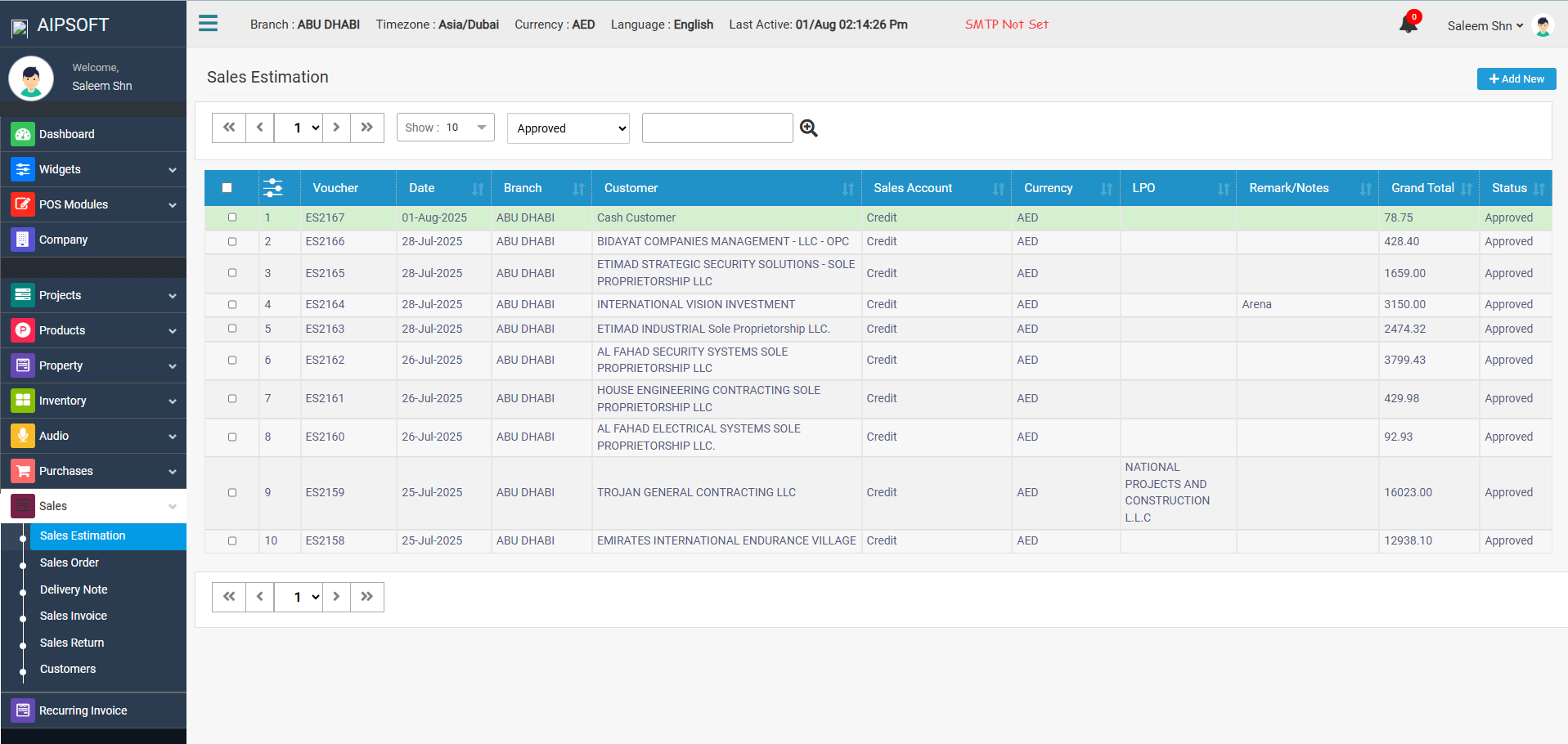
Sale Order
A Sale Order is an official document created by a business after receiving a customer’s confirmed purchase request.
It acts as a formal record of:
-
📦 What products/services the customer has requested
-
📅 When and how it should be delivered
-
💰 At what agreed prices and terms
Unlike a Sales Estimate/Quotation (which is just a proposal), a Sale Order confirms the customer’s intent to buy — but it doesn’t collect payment or reduce stock yet (in most systems).
Once fulfilled, it’s converted into a Sale Invoice.
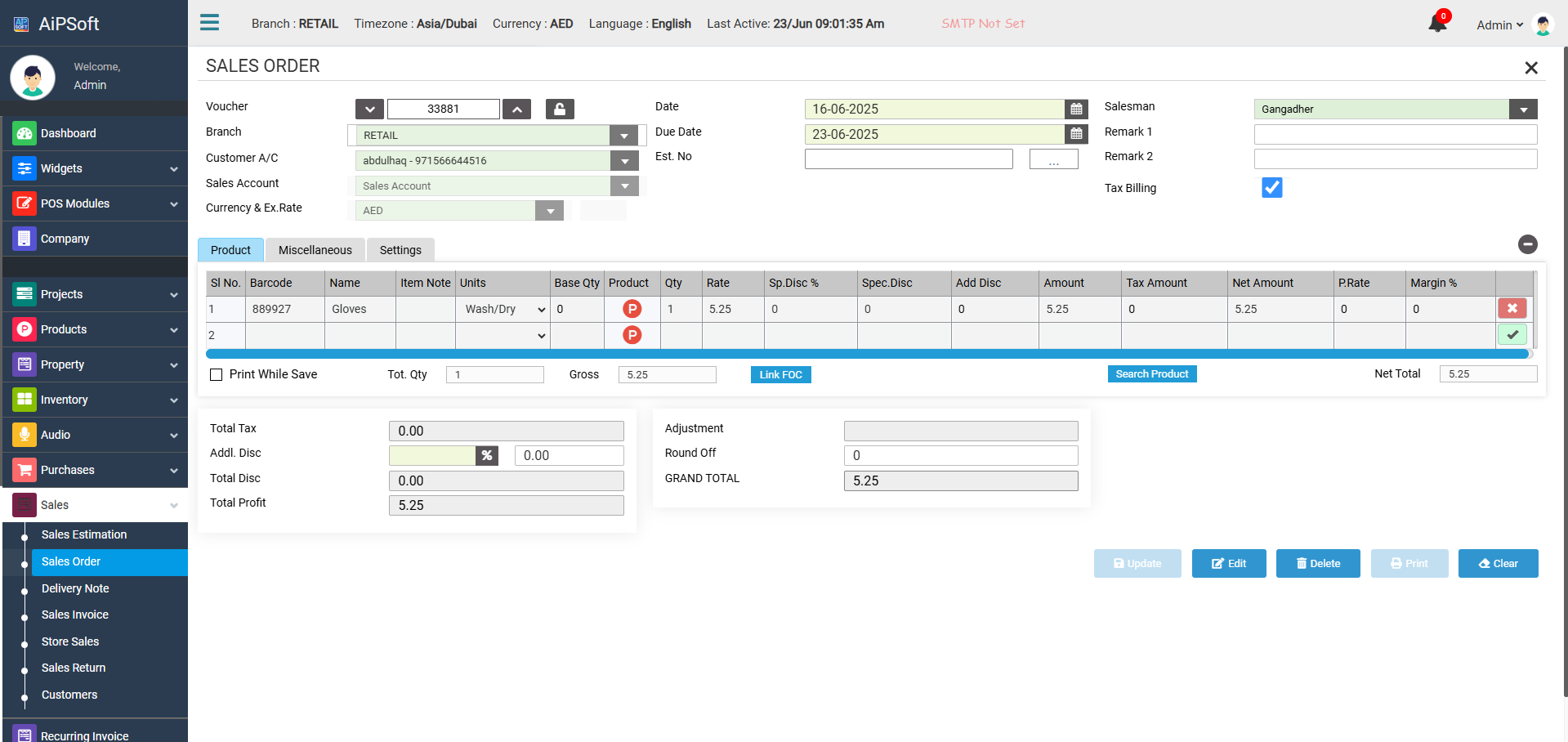
Sale Delivery
A Sale Delivery is the official transaction step where goods or services are handed over to the customer after a confirmed sale order.
It records:
-
📦 What was delivered
-
📅 When it was delivered
-
📍 To whom it was delivered
-
📊 In what quantity
In many systems, a Delivery Note (DN) or Delivery Challan (DC) is created at this stage as proof of delivery.
In some POS setups (like Laundry POS), Sale Delivery also marks the completion of a service — for example, returning cleaned clothes to the customer.
📑 How Sale Delivery Works
In a POS workflow:
1️⃣ Sale Order Confirmed
-
Items/services booked
2️⃣ Prepare for Delivery
-
Services completed / products packed
3️⃣ Generate Delivery Note
-
Record what’s being delivered, to whom, and how
4️⃣ Hand Over Goods
-
Deliver to customer at counter, doorstep, or via driver
5️⃣ Update POS
-
Mark order as delivered
-
Adjust stock (if needed)
-
Optionally, generate Sale Invoice if pending
Delivery Note
A Delivery Note (also called Delivery Challan in India) is a formal document that accompanies goods or completed services when they are delivered to the customer.
It records:
-
📦 What items/services are being delivered
-
📃 In what quantity
-
📅 On what date
-
📍 To which customer or delivery address
The Delivery Note acts as proof of delivery and is usually signed by the customer or receiver upon handover.
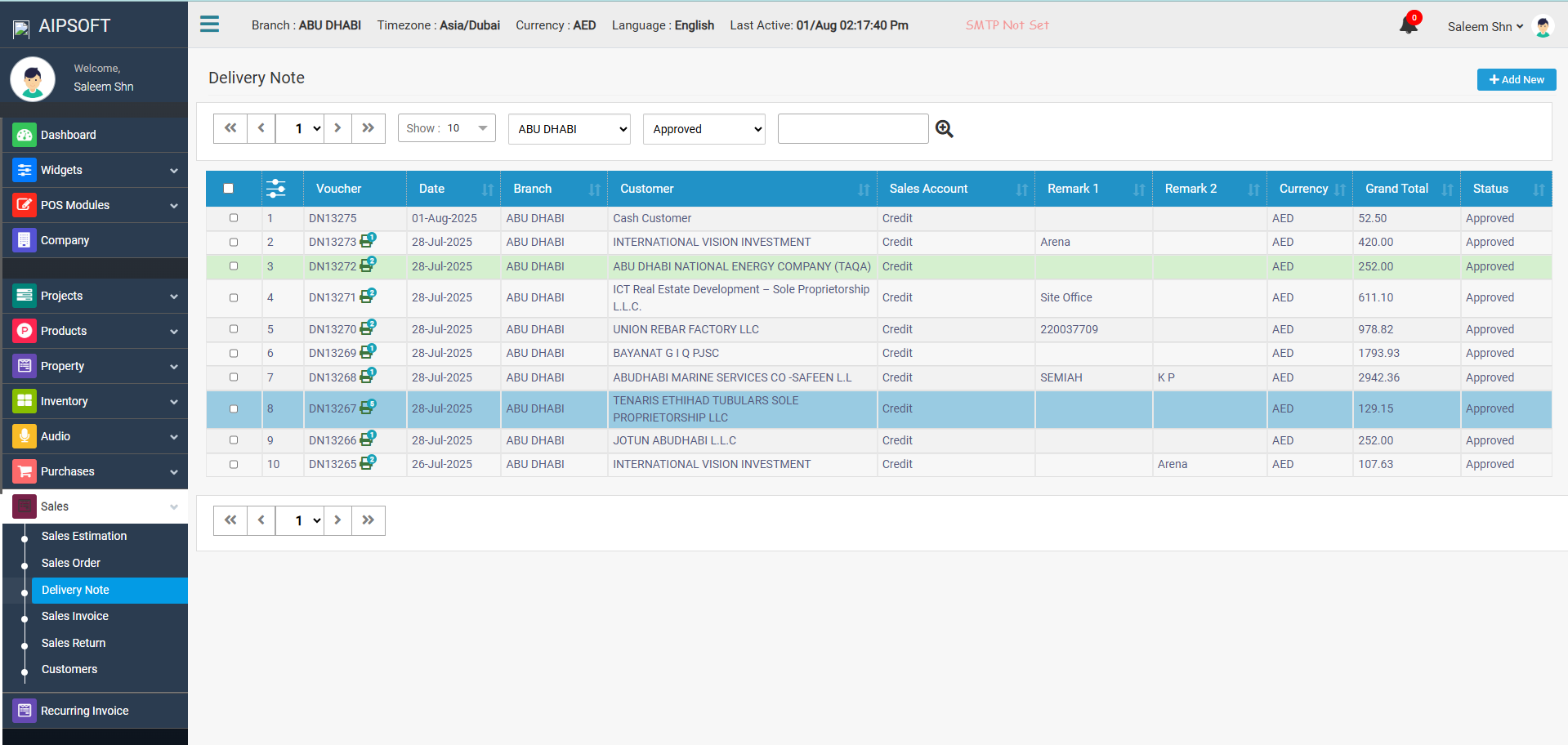
📑 How a Delivery Note Works
1️⃣ Sale Order Confirmed
-
Order booked in the system
2️⃣ Prepare for Delivery
-
Services completed / goods packed
3️⃣ Generate Delivery Note
-
Document listing delivered items and quantities
4️⃣ Hand Over Goods/Services
-
Deliver to customer or via driver
5️⃣ Get Customer Signature (if required)
-
To confirm acceptance of goods
6️⃣ Update Delivery Status
-
Mark order as Delivered
-
Adjust inventory stock
7️⃣ Proceed to Invoice (if pending)
Sale Invoice
A Sale Invoice is an official, legal document issued by a business to the customer after selling goods or services.
It confirms:
-
📦 What was sold
-
📅 On what date
-
📊 At what price and taxes
-
💰 What payment was made or is due
The sale invoice acts as both:
-
📃 A financial document for accounting
-
🧾 A receipt for the customer
In POS systems, the sale invoice is automatically generated at the end of a transaction.
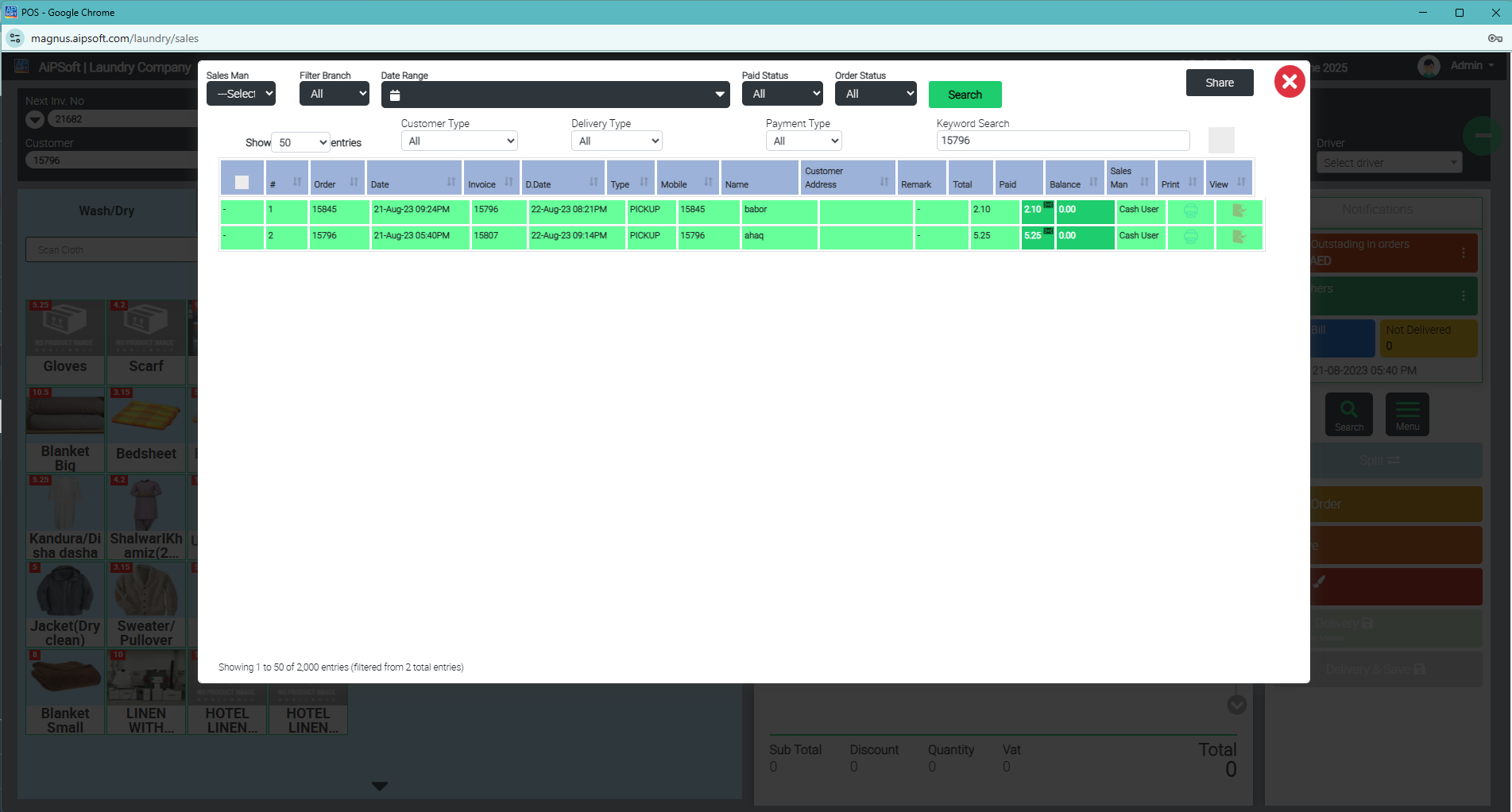
📑 How a Sale Invoice Works
1️⃣ Select Products/Services for Sale
-
Customer confirms purchase
2️⃣ Apply Prices, Discounts, and Taxes
-
Final billing prepared
3️⃣ Choose Payment Mode
-
Cash, Card, UPI, Wallet, etc.
4️⃣ Generate Sale Invoice
-
Unique Invoice Number created
-
Print or send via email/SMS
5️⃣ Update Stock and Sales Reports
-
Stock reduced (if applicable)
-
Revenue recorded
6️⃣ Customer Receives Invoice Copy
Sale Stores
Sale Stores refers to the physical or virtual store locations where sales are made and recorded in a POS system.
If a business operates from multiple branches or outlets, each is treated as a separate store or location in the system.
In POS software, Sale Stores help track:
-
📍 Where each sale took place
-
📦 Which location handled inventory
-
👥 Which staff or cashier processed the order
-
📊 Sales performance by branch
📑 Why Are Sale Stores Important in POS Software?
-
🧾 Tracks sales made at each branch separately
-
📦 Helps manage inventory per location
-
📊 Compares sales performance across stores
-
📍 Assigns staff, delivery zones, or drivers by store
-
📃 Filters reports, invoices, and accounting data
-
📝 Supports business audits and stock planning
Sale Return
A Sale Return is the process of returning sold goods or services back to the business by a customer.
It typically happens when:
-
📦 The product/service is defective or damaged
-
📃 The customer is dissatisfied
-
📅 The item was delivered late or incorrectly
-
💰 The customer wishes to cancel the service before it’s provided
When a Sale Return happens, the POS system:
-
🧾 Records the returned items/services
-
📊 Updates stock (if physical items are returned)
-
📑 Issues a credit note, refund, or adjusts the customer’s wallet balance
-
📃 Updates daily sales and return reports
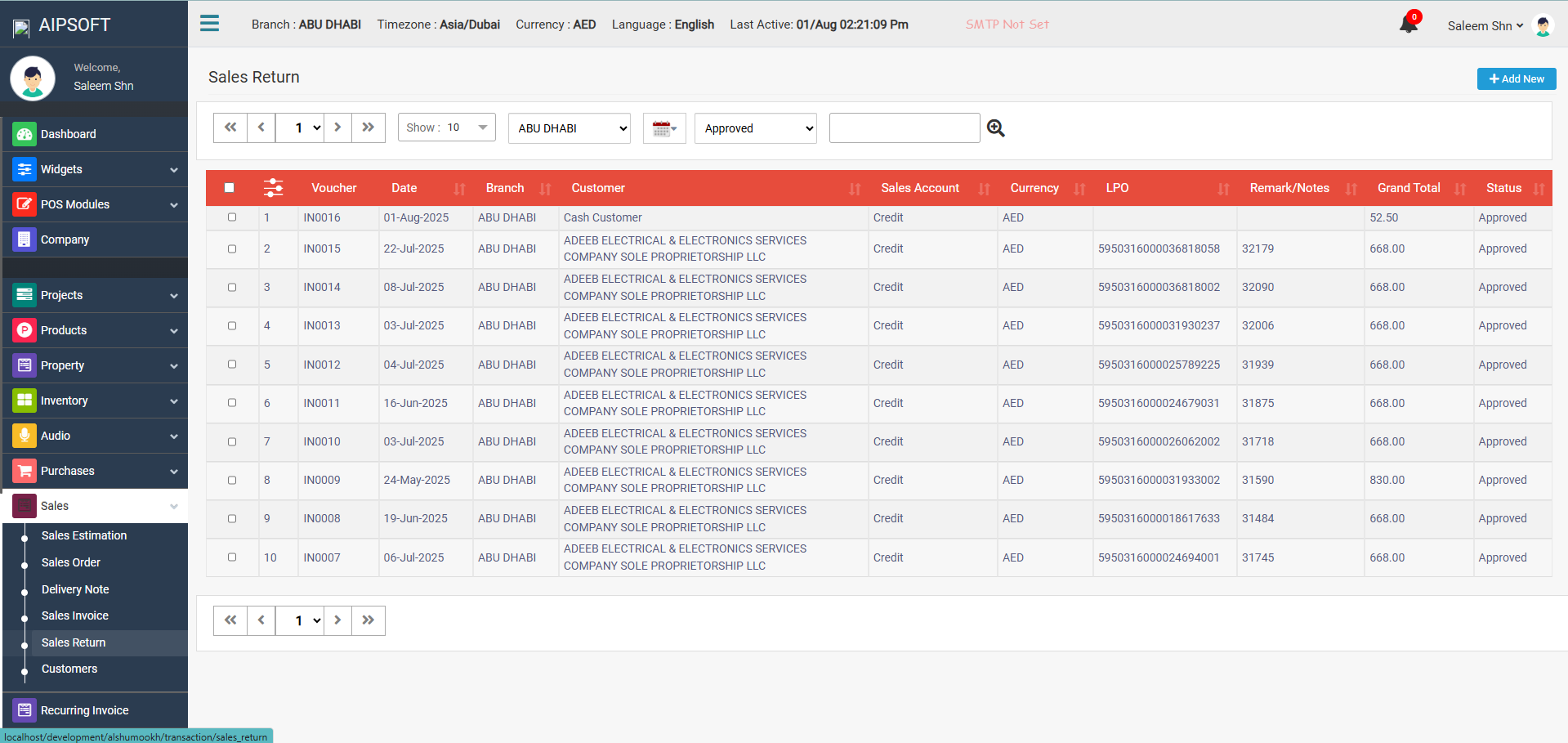
Customer
A Customer is the person or business who buys products or services from your company.
In a POS (Point of Sale) system, the customer's details are stored to track their transactions, payments, and preferences.
You can manage both:
-
🧍♂️ Walk-in customers (without saving details — like quick cash sales)
-
📒 Registered customers (with name, mobile, and history for better service)
